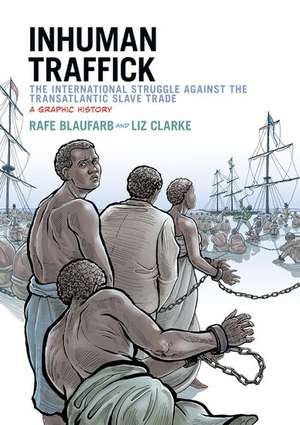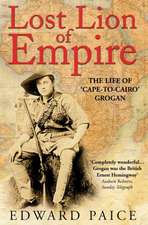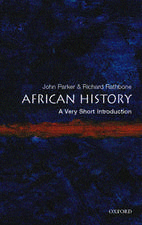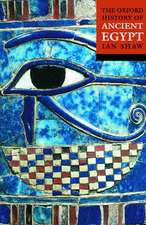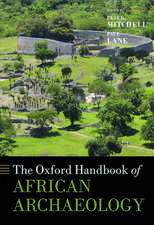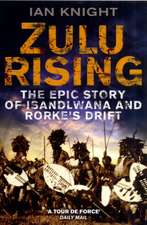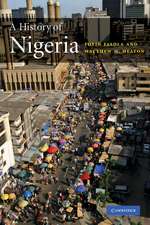Inhuman Traffick: The International Struggle against the Transatlantic Slave Trade, A Graphic History: Graphic History Series
Autor Rafe Blaufarb, Liz Clarkeen Limba Engleză Paperback – 12 feb 2015
Preț: 308.23 lei
Nou
Puncte Express: 462
Preț estimativ în valută:
58.98€ • 61.74$ • 48.80£
58.98€ • 61.74$ • 48.80£
Carte disponibilă
Livrare economică 15-29 martie
Preluare comenzi: 021 569.72.76
Specificații
ISBN-13: 9780199334070
ISBN-10: 0199334072
Pagini: 240
Dimensiuni: 254 x 188 x 18 mm
Greutate: 0.66 kg
Editura: Oxford University Press
Colecția OUP USA
Seria Graphic History Series
Locul publicării:New York, United States
ISBN-10: 0199334072
Pagini: 240
Dimensiuni: 254 x 188 x 18 mm
Greutate: 0.66 kg
Editura: Oxford University Press
Colecția OUP USA
Seria Graphic History Series
Locul publicării:New York, United States
Recenzii
A must read for all those interested in nineteenth-century Atlantic history.
Rafe Blaufarb and Liz Clarke have created an innovative and engaging teaching tool for the transatlantic slave trade in the era of suppression. It combines exhaustive research with accessibility, offers a superb overview of the traffic, and provides extensive original documentation of one of the most dramatic and poignant incidents in nineteenth-century maritime history.
Drawing together Kru sailors, Sierra Leonean craftsmen, illegal French slavers, British anti-slavery patrol ships, a corrupt Guadeloupe governor, and British and French politicians, Blaufarb weaves a remarkable tapestry of the historical forces that transformed the slave trade in the nineteenth century. Inhuman Traffick offers a beautifully illustrated panorama of the Atlantic World during the age of emancipation, one that will appeal to students and experts alike.
The use of graphic histories in the classroom is becoming widespread, and Inhuman Traffick shows why they can work so effectively to engage students. Like all of the best examples of the genre, Inhuman Traffick tells a compelling story through a complex interplay of image and text - it will keep students reading, and learning, to the very end.
Inhuman Traffick is a tour de force.
We are treated to the historical equivalent of 3D cinema as Dr. Blaufarb hits us from all angles: a traditional narrative that is concise and accessible; an innovative graphic history that brings the struggle against the slave trade to life; and a selection of primary sources that underscores the painstaking process by which historians explore the past. This is a truly groundbreaking approach to history.
My students will be delighted to have Inhuman Traffick added to their reading list.
a welcome addition to booklists for courses on Atlantic and Caribbean history and the history of slavery, plus also those concerned with historical methodology and archival research.
Rafe Blaufarb and Liz Clarke have created an innovative and engaging teaching tool for the transatlantic slave trade in the era of suppression. It combines exhaustive research with accessibility, offers a superb overview of the traffic, and provides extensive original documentation of one of the most dramatic and poignant incidents in nineteenth-century maritime history.
Drawing together Kru sailors, Sierra Leonean craftsmen, illegal French slavers, British anti-slavery patrol ships, a corrupt Guadeloupe governor, and British and French politicians, Blaufarb weaves a remarkable tapestry of the historical forces that transformed the slave trade in the nineteenth century. Inhuman Traffick offers a beautifully illustrated panorama of the Atlantic World during the age of emancipation, one that will appeal to students and experts alike.
The use of graphic histories in the classroom is becoming widespread, and Inhuman Traffick shows why they can work so effectively to engage students. Like all of the best examples of the genre, Inhuman Traffick tells a compelling story through a complex interplay of image and text - it will keep students reading, and learning, to the very end.
Inhuman Traffick is a tour de force.
We are treated to the historical equivalent of 3D cinema as Dr. Blaufarb hits us from all angles: a traditional narrative that is concise and accessible; an innovative graphic history that brings the struggle against the slave trade to life; and a selection of primary sources that underscores the painstaking process by which historians explore the past. This is a truly groundbreaking approach to history.
My students will be delighted to have Inhuman Traffick added to their reading list.
a welcome addition to booklists for courses on Atlantic and Caribbean history and the history of slavery, plus also those concerned with historical methodology and archival research.
Notă biografică
Rafe Blaufarb (Ph.D., University of Michigan) is Ben Weider Eminent Scholar Chair and Director of the Institute on Napoleon and the French Revolution in the history department at the Florida State University. He is the author of books and articles on French history, as well as several articles on other topics, including Atlantic and Latin American history.
